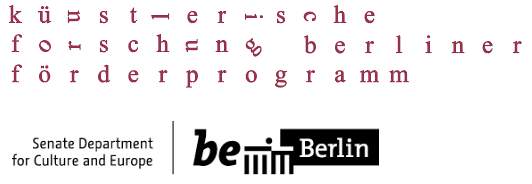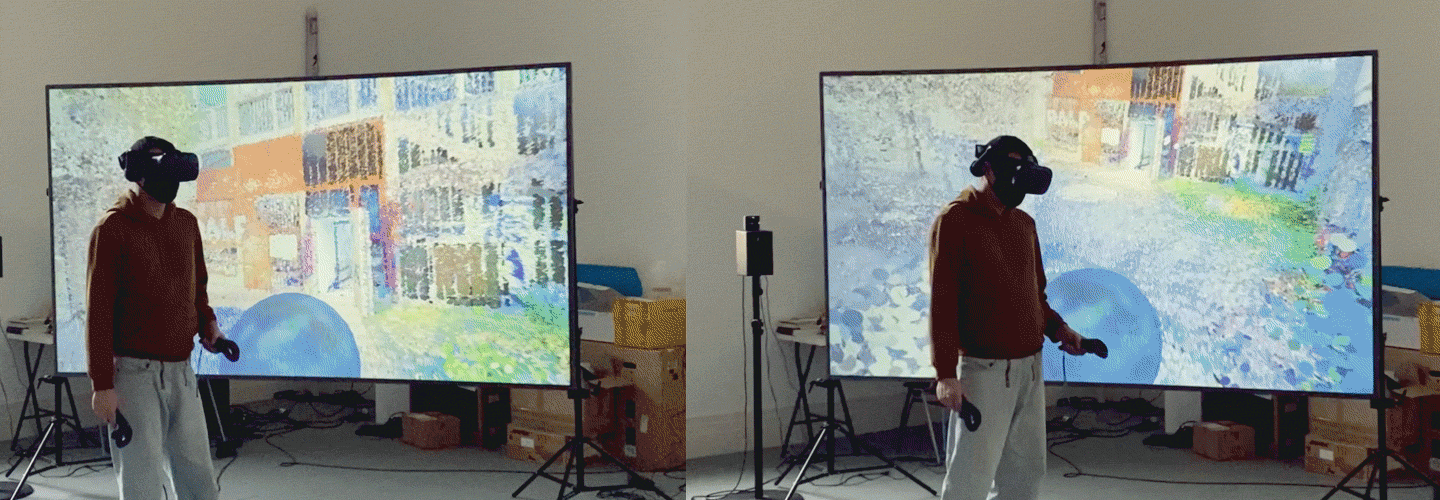Rheim Alkadhi, Mareike Bernien & Alexandra Gerbaulet, Marianna Christofides, Anke Dyes, Maria Eichhorn, Miriam Jakob & Jana Unmüßig, Christoph Keller, Katrin Mayer, Kamila & Jasmina Metwaly, Fehras Publishing Practices (Kenan Darwich, Omar Nicolas & Sami Rustom), Doireann O’Malley, Stefan Römer, Anna Zett & Hermann Heisig
The Berlin Artistic Research Grant Programme supports and encourages artistic research across disciplines. Every two years, grants are awarded to 13 research projects, to both individuals and groups based in Berlin. In addition, a public programme at Haus der Statistik and online offersinsights into the research projects and responds to questions stemming from the field of artistic research. The section Plural, on the programme’s website, is a growing resource where you can find:
Virtual Tendencies is a filmed series of talks, screenings, lecture performances, LARPs and VR experiences organised as part of ongoing research by artist Doireann O’Malley with the assistance of Thomas Butler. Taking place at Berlin’s Haus der Statistik, the first iteration will be officially launched on the Berlin Artistic Research Grant Programme website in mid-January 2021, followed by a public Q&A online event on January 28, 2021. Guests include Calum Bowden, Adam Fearon, Rindon Johnson, Omsk Social Club and Simon Speiser. By expanding on the concept of the virtual as a representational system created and powered by a vast global infrastructure that mediates our daily lives, and as a technological metaphor for consciousness, Virtual Tendencies will touch on myriad themes, from our accelerating cyber symbiosis; virtual embodiment and gender; ecology and resource extraction; affective computing and the online casino environment; to trauma and mental health.
Voice of the Wind is Not a Metaphor is an ongoing artistic research by Jasmina and Kamila Metwaly looking into the multimodality of voice, trying to explore what a voice means: How voice is shaped, how it forms outside of the lexicon of the mouth. In this video collage capture, amongst others, we listen to Halim El Dabh’s Leila and Magnoun, Augustine’s yawn, and Ute Wassermann’s roars and ululations.
The second short documentary introduces Resonanz by Anna Zett & Hermann Heisig, a transdisciplinary collaboration that uses participatory group improvisation to engage in post-socialist memory as a speculative practice, specifically in relation to the former GDR. In a kind of game play, fictional narratives are told, dis/continued, put into motion. The emphasis is not on the personal story of the participant, but on the embodied practices of proposing, responding, witnessing, intervening, experiencing.
From 1946 to 1990, SAG Wismut mined uranium in Saxony and Thuringia for the USSR’s nuclear weapons programme. In their filmic research project based on the map of former mining areas, Mareike Bernien and Alex Gerbaulet move horizontally into today’s landscapes, which are characterized by redevelopment, and vertically through the ground, as an archive. They undertake deep drillings through space and time to trace the sedimented narratives that surround the element uranium materially, metaphorically and geo-politically. How does uranium continue to haunt these landscapes? What biographies surround its excavations? How can the spectrum of the visible be shifted in order to bring the invisible into the picture, make it audible or perceptible?
Moreover, a recording of Tom Holert’s talk Implicated Epistemically. On Contemporary Art’s Reliance on “Knowledge” is available online. Holert introduces his latest book Knowledge Beside Itself. Contemporary Art’s Epistemic Politics (Sternberg Press, 2020) before pursuing some concerns leading beyond its given scope, in particular the notion of “implicatedness,” and addressing the ways the pandemic is affecting art’s peculiar relation to politics and economies of knowledge.
Descriptions of the individual research projects can be found at kuenstlerischeforschung.berlin/stipendiatinnen.
Our thanks go to all those who have attended, followed and facilitated these first months of the Berlin Artistic Research Grant Programme. Special thanks to Silke Briel, Till Gathmann, Karam Ghoussein, Carina Herring, Beatrice Hilke, and Ilke Penzlien.
Berlin Artistic Research Grant Programme is funded by the Senate Office for Culture and Europe Berlin, its umbrella organisation is the Society for Artistic Research in Germany (gkfd).
Contact
Berliner Förderprogramm Künstlerische Forschung
Rike Frank, Executive Director
Kathrin Busch, gkfd Advisory Board
Haus der Statistik, Otto-Braun-Straße 70-72, 10178 Berlin
info [at] kuenstlerischeforschung.berlin


